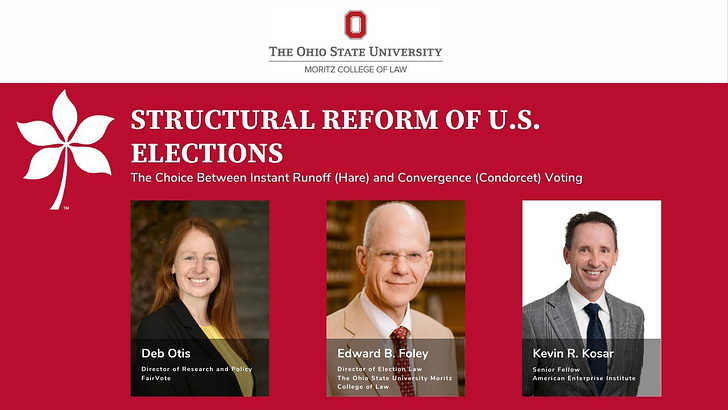Elections create incentives. So let's talk about structuring them to incentivize better governance
And will the defense spending bill reach the President's desk before September 30?
I had the pleasure of joining a webinar where Ohio State University’s Ned Foley and Fair Vote’s Deb Otis discussed and debated Hare voting (AKA instant runoff) versus Condorcet voting.
Say what, you ask?
Hare voting is “a method of voting in which voters rank candidates in order of preference - 1st choice, 2nd choice, 3rd choice, etc. All first choices are tallied and in a single-winner race, if no candidate receives a majority (50%+1) of first-choice votes, the less popular candidates are eliminated and ballots cast for these candidates are redistributed to more popular candidates, based on their voters’ second choices, until one candidate wins with a majority.”
Condorcet voting is “quite different from instant runoff voting. Condorcet voting elects a candidate who beats all other candidates in pairwise elections. To figure out the Condorcet winner, we need to consider all pairwise elections. Consider two candidates A and B, if A is ranked higher than B on a majority of ballots, then A beats B, otherwise B beats A. A candidate who beats all other candidates in this way is the winner.”
In short, we were talking about alternatives to the first-past the post, single-vote, plurality system that is used in much of America.
Why?
Because the structure of elections affects candidate quality, candidate behavior during an election, and elected officials’s behavior. Our current partisan primary system, for example, incentivizes candidates to run to the far left and right of their parties and then once in office to spend a lot of time either being far left or far right or wasting time engaging in symbolic leftist or rightist activities, like introducing bills that throw red meat to their most extreme voters but that have no chance of being made law.
What’s the best election system for America? Beats me, and I would argue that there is no best system for each and every district and state in the country. But if we are ever going to improve governance we need to look at systemic election reforms.
Whither the defense appropriations legislation?
The House of Representatives passed the defense spending bill on June 28. So does that mean the legislation is off to the Senate for action before the fiscal year ends on September 30? Maybe not, notes Don Wolfensberger, who found something interesting in the rule setting up a vote on the Defense appropriations bill.
“It is tempting to predict that this year’s earlier start bodes well for a timely completion of the appropriations process. However, there is a catch-22 in the final section of this rule, identical to one in last year’s third rule. It bars the House Clerk from transmitting to the Senate the Homeland Security appropriations measure “until notified by the Speaker that H.R. 2 [the comprehensive border security bill] as passed by the House on May 11, 2023, has been enacted into law. That caveat was largely responsible for putting the two houses at loggerheads last year, necessitating a string of serial continuing resolutions, and delaying finalization of the appropriations process until March 1 — five months into the new fiscal year. Brace yourselves for a possible repeat performance.”
Speaking of structural election reform
Russell Berman, “How 2024 could transform American elections,” The Atlantic, May 31, 2024:
The legislative dealmaking that ensued was exactly what the designers of Final Four Voting had hoped for when Alaskans approved the system in a 2020 statewide referendum. In essence, Final Four is a radical reform designed to de-radicalize politics. Its purpose is to make general elections more competitive and to encourage compromise among lawmakers who had previously held on to power simply by catering to a small, polarized primary electorate that determines the winners of most modern campaigns. This year could be an inflection point for the reform: Four more states—ranging from blue to deep red—could adopt versions of Final Four, and Alaskans will vote on whether to repeal it.
Wowza of the month
The New York Times’ Ross Douthat interviewed Senator J.D. Vance (R-OH). They had this exchange regarding January 6 and the GOP faction aiming to get Vice-President Mike Pence to reforse to count certain states’ electoral slates.
Douthat: Why can’t you say, “It was wrong the way the military and the administrative state behaved under Trump, and it also would’ve been a really, really bad idea for Mike Pence to intervene on Jan. 6”?
Vance: If the conservative response to this is to say “both sides are bad,” and the liberal response to this is to say “it’s fine when my side does it, and it’s bad when the other side does it,” the liberals will always win the argument in this country. I really don’t believe this is about some deep principle; this is about power.



